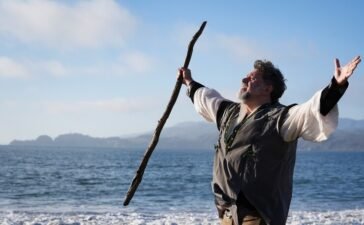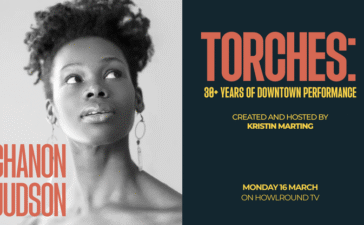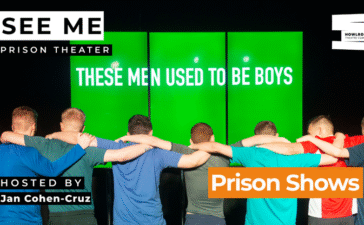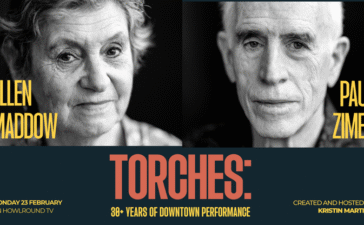The TCG National Conference is one of the largest nationwide gatherings of the nonprofit theatre community. TCG has been gathering folks this way since 1976 and each year, the National Conference creates space for theatre practitioners across the globe to get inspired, learn from one another, and build toward collective action. It’s also been a way for TCG and the field to get intimately familiar with theatre communities around the country, and to channel the particular energy of their artists.
In 2020, while we supported the field in contending with overlapping existential crises, TCG also completed a new strategic planning process. In our new plan, bolstered by our new mission to lead for a just and thriving theatre ecology, we’ve committed to centering the needs and experiences of BIPOC (Black, Indigenous People of Color) and BITOC (Black, Indigenous, Theatres of Color) throughout our programming. With that ongoing work in mind, it is our goal that our conferences will have some, if not all, of the following outcomes:
Participants come away with new ideas and tools for activating models of collective care.
BIPOC, TGNC, disabled, and young theatre practitioners see more opportunities for leadership and collaboration open to them throughout the field.
Incremental yet transformative shifts in power structures and organizational practices begin to emerge in theatres across the country, and those shifts begin to create safer, human-centered working conditions for our freelance artists.
The local theatre community builds off their shared work on the TCG Conference into a longer term, inclusive process of peer support and collaboration, and host city artists are invited to bring their work into other regional theatre communities.
In 1976, TCG convened its first ever National Conference. For the first few decades, the National Conference was biennial, held first on college campuses and then in cities across the country. In 2006, the National Conference became an annual event, and in 2020, we went virtual in response to the pandemic. In 2022, we held our first-ever hybrid National Conference, gathering in Pittsburgh, PA and online.
Schedule
Thursday, June 20
ENOUGH! Plays to End Gun Violence
9 a.m. – 10:30 a.m. PDT (San Francisco, UTC -7) / 11 a.m. – 12:30 p.m. CDT (Chicago, UTC -5) / 12 p.m. – 1:30 p.m. EDT (New York, UTC -4)
Since 2019 and over three program cycles, ENOUGH! Plays to End Gun Violence has brought together thousands of artists at the intersection of art, activism, and amplifying teen voices in vital evenings of theater that allow communities to confront the issue of gun violence. Founder and Joaquin Oliver Artistic Producer Michael Cotey, along with past ENOUGH! collaborators in a conversation led by Michael Rohd, will share what has been successful with this model for calling on submissions from new teen writers, how it has created a new pipeline for young playwrights; how it’s nationwide reading has led to meaningful, lasting collaborations; and what it means to think of approaching theater as an “inciting incident.” This conversation will include a presentation of one of ENOUGH’s 2022 plays SOUTH SIDE SUMMER by young Chicago playwright McKennzie Boyd.
Michael Cotey
Loria Perez
Michael Rohd
McKennzie Boyd
Dr. Quenna Lené Barrett
Aaron Nichols
Friday, June 21
Creating Accessible and Values-Driven Multimedia Content
10 a.m. – 11:15 a.m. PDT (San Francisco, UTC -7) / 12 p.m. – 1:15 p.m. CDT (Chicago, UTC -5) / 1 p.m. – 2:15 p.m. EDT (New York, UTC -4)
Join HowlRound Theatre Commons for a panel discussion featuring HowlRound staff members and series curators. We’ll explore the process of designing, curating, and publishing multimedia theatre content with a focus on values-driven storytelling. We’ll discuss livestreaming events, producing podcasts, and creating essay series, from concept to publication. Attendees will gain insights into what it takes to craft digital content that prioritizes progressive and disruptive ideas. This discussion will equip you with the tools to create accessible, values-driven conversations in our increasingly remote field.
Julia Schachnik
Ramona Rose King
Vijay Mathew
Jordan Ealey
Leticia Ridley
Chantal Bilodeau
Pass the Torch(es): Navigating Transitions to Expanded Leadership Structures @ Fine Arts Building, Annex Studio B
2:30 p.m. – 4 p.m. PDT (San Francisco, UTC -7) / 4:30 p.m. – 6 p.m. CDT (Chicago, UTC -5) / 5:30 p.m. – 7 p.m. EDT (New York, UTC -4)
During this time of vast leadership transition in the field, there is also an unprecedented number of theatres and other arts and nonprofit organizations exploring more distributed and shared leadership structures. Some are doing both at once. What does a process look like that successfully navigates a thoughtful shift in organizational structure and leadership simultaneously? This session will hear from organizations who have made such transformations recently, with both victories and challenges to share, and with useful takeaways for other organizations undergoing such changes now or in the near future.
Mei Ann Teo
Sara Zatz
Cynthia Fuhrman
Megan Wanlass
Sunder Ganglani
Saturday, June 22
Session TBA
9:30 a.m. – 11 a.m. PDT (San Francisco, UTC -7) / 11:30 a.m. – 1 p.m. CDT (Chicago, UTC -5) / 12:30 p.m. – 2 p.m. EDT (New York, UTC -4)
Details to come.
Theatre Futures hosted by American Theatre Magazine
11:30 a.m. – 12:45 p.m. PDT (San Francisco, UTC -7) / 1:30 p.m. – 2:45 p.m. CDT (Chicago, UTC -5) / 2:30 p.m. – 3:45 p.m. EDT (New York, UTC -4)
It’s no secret that the nonprofit theatre is at a crossroads that has pushed us to reimagine, reorient, and reinvent the way we create art and do business. To speak to this moment, American Theatre magazine, with support from the Ford Foundation, is publishing a series of 16 essays written by some of the brightest minds in our industry, inviting us to imagine vibrant possibilities for our artform. To kick off the series, Lane Harwell, senior program officer, creativity and free expression at Ford Foundation, will moderate a panel including Martine Kei Green-Rogers, dramaturg, playwright, and professor in The Theatre School at DePaul University; Jocelyn Prince, principal at ALJP Consulting; and Michael Rohd, co-founder/member of Sojourn Theatre and director of Co-lab for Civic Imagination at the University of Montana. They will discuss what a brighter future for theatre in the U.S. can look like and how we can create where we’re going with new tools. Join us for a dynamic and engaging conversation!
Martine Kei Green-Rogers
Lane Harwell
Jocelyn Prince
PennyMaria Jackson
Charlique Rolle
In the origin story of Chicago—and its evolution into one of the most vibrant cultural capitals of the world and one that is continually named as The Best Big City in the U.S.—a catalyzing event that transformed the city was the infamous Great Fire of the 19th century. The Fire is now commonly understood as the consequence of poor urban planning, embedded structural flaws that cost hundreds of homes, businesses, and lives. Devastated as it was, the city seized the moment as an opportunity for a rebuilding process that left behind an era of outdated design and resulted in one of the most architecturally advanced cityscapes and culturally eclectic epicenters of the modern era. The lore of Chicago’s history and rebirth reveals a useful recipe for metamorphosis: a healthy dose of grit, a splash of ingenuity, a penchant for collaboration, and a will to always do better by its people.
The story of Chicago echoes the story of our field—comprising many stories—that we are still telling. “The field is on fire,” we say, and we stay. As antiquated structures smolder around us, we seize the moment as one of possibility, we look around, and we try to determine what we will save. From 20-22 June 2024, TCG and the League of Chicago Theatres will welcome theatre practitioners to the City of the Big Shoulders, where together we will answer the call of possibility, design new tools, and get to worldbuilding. We will take inspiration from Chicago’s energetic and diverse theatre community to scaffold new structures and begin telling our stories anew. We will work, we will play, and we will visit new places; at our first national gathering in two years, and our second hybrid Conference, TCG’s in-person programming will burst out of the confines of a hotel, and disperse into the city’s many cultural venues, historical sites, and hubs of creative innovation. Keep an eye out for both in-person and virtual registration to launch in November, and join us in June (with your sleeves rolled up).
You Might Also Like
The Tempest Crashes Ashore at Point Montara
By Nicole Gluckstern. Berkeley Shakespeare Company’s site-responsive The Tempest took over the Point Montara Lighthouse Youth Hostel. Source link...
A Conversation with Chanon Judson
By Kristin Marting. On 16 March 2026, TORCHES will continue with a conversation with critically acclaimed choreographer and performer Chanon...
Prison Shows
By Jan Cohen-Cruz. In this episode, shows develop in the various workshops. The impact of making, performing, and being seen...
A Conversation with Talking Band
By Kristin Marting. On 23 February, TORCHES will continue with a conversation with the prolific Ellen Maddow and Paul Zimet....










